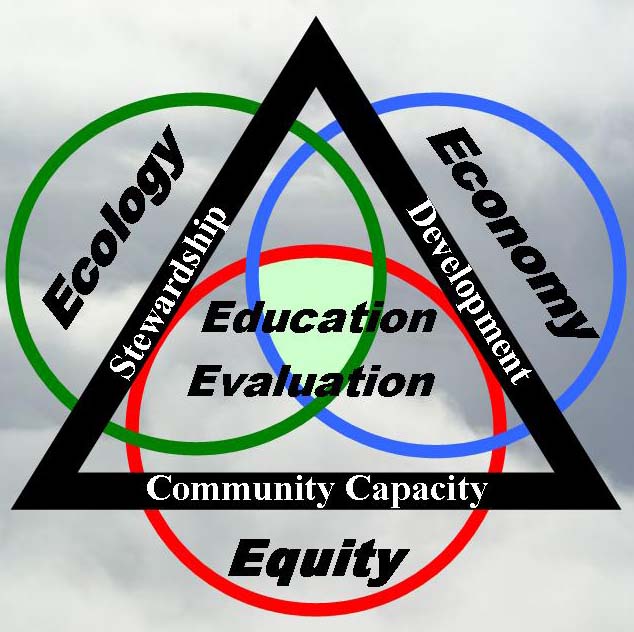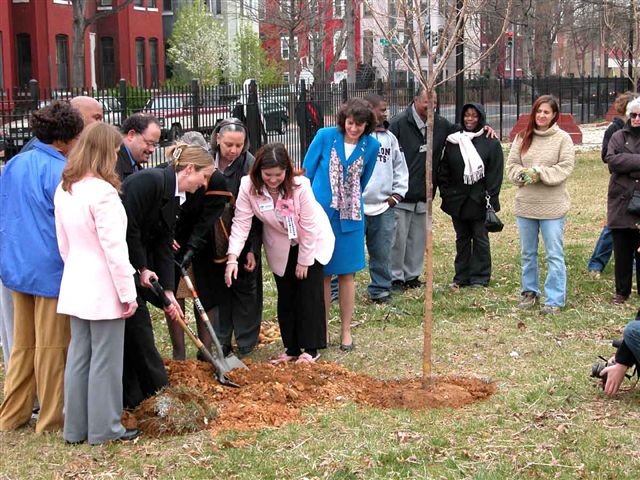In
1962, Rachel Carson published the book “Silent Spring,” which
exposed the dangers of insecticides and inspired the environmental
movement. Sadly, as E. O. Wilson observed in 2002, "we
are still poisoning the air and water and eroding the biosphere"40
years after Rachel Carson started us thinking about these
things. Society’s present situation can be summed up
by human disregard of natural laws, which is having disastrous
consequences for the future of all life on Earth. Along with
the possibility of the extinction of mankind by nuclear war,
the central problem of our age has become the contamination
of human's total environment with such substances of incredible
potential for harm — substances that accumulate in
the tissues of plants and animals, in the atmosphere, and
even penetrate the germ cells to shatter or alter the very
material of heredity upon which the shape of the future depends.
A world without plants, animals, birds and fish is not sustainable.
And a global society that is driven by the emotion
of fear cannot find the answers. Sustainability is about a
transformation of human
consciousness that will allow our
small, endangered planet and its interdependent species
of plant and animal life to survive, endure, and thrive.
Fear, anxiety and denial are not sustainable. Only hope
and the courage to act decisively are sustainable. And
this action for global change begins on the local level
because we must take drastic action to reduce the depletion
of resources, carbon emissions, and other pollutants, which
includes educating for sustainability.
Unfortunately, most people think sustainability implies
converting SUVs to run on salad oil, or heating our homes
with cow chips instead of oil or gas. These actions could
certainly help, but sustainability is not just about driving
a hybrid car, recycling newspapers and cans, turning the
thermostat down or replacing incandescent bulbs with compact
fluorescents. It's also not only about putting up windmills
and solar panels, although these are real money-savers
for those who can afford them.
Sustainability implies informed civic engagement and
working partnerships among diverse groups in the community
systemically/simultaneously considering economic, social,
and environmental needs so that all people can enjoy a
decent quality of life. Social and economic systems that
force people to live in ecologically degraded places or
choose between rent and food are not sustainable. Poverty,
illiteracy, and disease are not sustainable. Offering expensive
catastrophic medical insurance in place of health care
that supports wellness for every man, woman, and child
is not sustainable. Racism, sexism and homophobia are not
sustainable. Hatred, violence and war are not sustainable.
Sustainability is about cherishing biodiversity and human
wellness, equity, and freedom. It means maintaining economic
security without contaminating the water, soil, and air.
It requires creating economic and social systems that concurrently
meet human physical needs, such as adequate clothing and
shelter, nutritious food, a good job, and affordable health
care, along with needs of the spirit like music and laughter,
family and friends, and enjoying the wonders of nature.
Modern agribusiness is not sustainable when we ship fresh
food 1,500 miles in gas-guzzling trucks instead of supporting
local family-owned organic farms. Profit-based corporate
practices such as injecting carbon monoxide into beef to
make it look fresh and adding high fructose corn syrup
to a wide variety of foods and beverages to save money,
in defiance of studies that show they cause brain damage,
diabetes and cancer, are not sustainable. Strip malls and
mega-chains that depend on cheap, dirty energy and exploited
workers are not sustainable.
A sustainable society
needs an educated workforce comprised of people who
work
with their hands — farmers, fishermen
and skilled craft and trades people — as well as
teachers, doctors, and business managers. Sustainable education
is interdisciplinary, multicultural, and holistic. Sustainable
schools teach critical thinking and conflict resolution
skills along with mathematical and scientific literacy.
Schools without music, arts and real physical education
are not sustainable. Ignorance of history, philosophy,
world religions, and literature is not sustainable.
In a world desperately in need of compassionate problem-solvers
who have imagination and creativity, inordinate emphasis
on teaching to standardized tests is not sustainable. Sustainable
schools encourage intellectual curiosity and empower children
to be life-long learners and wise human beings.
Oral storytelling and written literature, philosophy,
theology, science, and the arts have given us diverse visions
of the interconnectedness of all creatures, great and small,
which cling to the web of life. Even before Aristotle argued
that beauty has an ethical dimension, the spider's web
was admired by Native American and African storytellers
as a shimmering symbol of the strength and fragility of
life.
Sustainability
is about stewardship, cooperation and moral responsibility — about
treating all living creatures as embodiments of a universal
spirit. It means
learning
from our mistakes and correcting them, as well as regaining
a sense of proportion and caring about the world we live
in enough to reduce needless acquisition of extravagant
consumer goods that end up as mountains of garbage that
leach toxins into the soil.
Many
of the ideas here were adapted from an Opinion Editorial
of Laurie Robertson-Lorant in the January 8, 2008
SouthCoast Today Newspaper.
|




